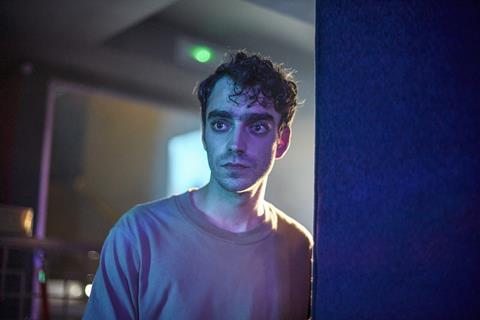The fourth film from Spain’s Carlos Vermut takes its isolated protaganist into dark territory

Dir/scr: Carlos Vermut. Spain. 2022. 115mins
Twenty-something Madrid native Julian (Nacho Sanchez) is a creature modeller for video games. But even when he isn’t locked into his VR headset, he’s somehow removed from the world around him. Then a shocking event – he saves a child from a fire in the apartment next door – triggers a spiralling exploration of hitherto untapped darker impulses. Carlos Vermut’s subdued but potent exploration of one man’s struggle with a side of his psyche that he barely admits to himself, let alone understands, makes for uneasy viewing. Yet it’s a provocative and intelligently handled picture which explores the impact of isolation and social dislocation on a troubled soul.
A provocative and intelligently handled picture which explores the impact of isolation and social dislocation on a troubled soul
This is the fourth feature from writer/director Vermut, who previously won the San Sebastian prizes for Best Film and Best Director with his 2014 title Magical Girl. His 2018 picture Quién te cantará also went on to win a prize in San Sebastian as well as several awards elsewhere on the festival circuit. Manticore screens in competition at Tokyo following a world premiere in the Contemporary World Cinema strand at Toronto and further berths including London and Sitges. Further festival play seems likely and, while definitely on the feel-bad end of the spectrum, this might be a title which could find a home with a curated streaming platform, or an adventurous arthouse distributor.
It’s no accident that Julian makes a living conjuring up monsters from his mind. His current commission, for a computer game company run by a friend, is to design the fearsome undead apex predator for their new fantasy adventure game. It’s a fairly standard slavering zombie monster dog, with an excess of teeth and parts of its skull revealed. But following his encounter with the little boy in the burning flat, Julian becomes uncomfortably aware that his own mental monsters are altogether more terrifying.
Deliberately insulated from the world outside, Julian permits himself a tentative exploration, through his VR software, in the direction that his newfound impulses are compelling him. His attraction to Diana (Zoe Stein), who he meets through a work colleague, is initially linked to this awakening, before their genuine connection and affection allows him to overcome this moment of weakness. But, the film asks, is it really possible to come back from the darkest of mental places?
The film’s expressive cinematography keeps Julian largely in shadows, like some kind of wide-eyed nocturnal creature. And when he is lit, it tends to be in unnatural throbbing neons or the reflected glare from a computer screen. The use of sound – and silence – also emphasises his distance from the rest of the world. He is forever clamping on noise-cancelling headphones or closing his windows to insulate against the ambient hum of the city. The world is at arm’s length.
But the problem, as Julian discovers, is when you drift too far from society and social norms, sometimes society doesn’t want you back. A staggering scene towards film’s end, in which the camera rests, for an extended period, on Julian’s face, tells us everything we need to know about unspeakable urges and the furthest reaches of despair.
Production company: Aquí y Allí Films, Bteam Prods
International sales: Film Factory Entertainment info@filmfactory.es
Producers: Pedro Hernandez Santos, Alex Lafuente, Roberto Butrageuno, Amadeo Hernandez-Bueno, Alvaro Portanet Hernandez
Cinematography: Alana Mejía González
Production design: Laia Ateca
Editing: Emma Tusell
Music: Damián Schwartz
Main cast: Nacho Sanchez, Zoe Stein, Álvaro Sanz Rodríguez






![The Brightest SunScreen[Courtesy HKIFF]](https://d1nslcd7m2225b.cloudfront.net/Pictures/274x183/3/5/0/1448350_thebrightestsunscreencourtesyhkiff_312678.jpg)













![The Brightest SunScreen[Courtesy HKIFF]](https://d1nslcd7m2225b.cloudfront.net/Pictures/100x67/3/5/0/1448350_thebrightestsunscreencourtesyhkiff_312678.jpg)



